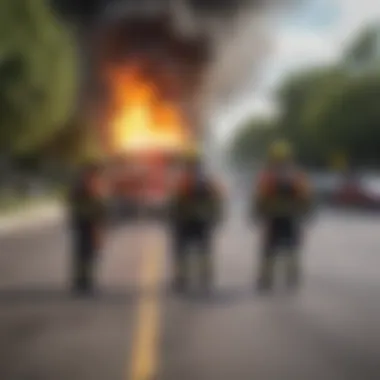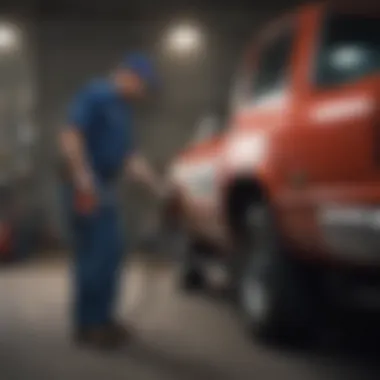Understanding Propane Leaks: Who to Call and What to Do


Intro
Propane is a common fuel source, used widely for heating, cooking, and even vehicles. It's convenient but comes with significant responsibilities. Understanding the risks, especially regarding propane leaks, is essential for homeowners, vehicle owners, and business operators. The implications of a leak can be severe, leading to safety hazards and substantial property damage.
This guide aims to clarify the necessary steps in the event of a propane leak, from identifying the signs to knowing who to contact. By being informed and prepared, individuals can minimize risks and enhance safety.
Coverage Options
Types of Coverage Available
In the context of propane use, insurance coverage may not be the first thing on a homeowner's mind. However, it’s crucial to understand the types of coverage that could protect against potential losses related to propane incidents. Different insurance policies may cover various aspects, including:
- Homeowners Insurance: Standard coverage often includes protection against damages from fires and explosions caused by propane leaks.
- Liability Insurance: This may provide coverage if a leak affects neighbors or others, leading to injuries or property damage.
- Commercial Insurance: For small businesses using propane, specific coverage can protect the business from losses due to leaks or equipment failures.
Liability Coverage Explained
Liability coverage can be pivotal for both homeowners and business owners. This type of coverage protects against legal responsibilities if a propane leak causes harm to others or damage to property. It’s advisable to review the terms, as the extent of liability coverage can differ significantly. Key points to check include:
- Policy Limits: Understanding the maximum amount your policy will pay in the event of a claim is critical.
- Exclusions: Be aware of what incidents or damages are not covered under your policy.
Key Considerations
Factors to Assess When Choosing Insurance
When selecting insurance related to propane use, consider the following factors:
- Location: Areas with higher risks, such as those prone to accidents, may require more comprehensive coverage.
- Type of Use: Residential use differs from commercial use; each has unique coverage needs.
- Cost: Weigh the cost against the potential risk to ensure you have adequate protection without overspending.
Understanding Policy Limits
Comprehending the limits of your insurance policy is integral to being prepared. Policy limits determine the maximum amount your insurance will pay in claims. Here are some aspects to keep in mind:
- Comparative Analysis: Review various policies to understand how limits can vary.
- Additional Coverage Options: Consider endorsements or additional coverages that could enhance your base policy for better protection.
"Proactive measures and proper insurance choices can significantly mitigate risks posed by propane use."
Through understanding propane leaks, their implications, and proper coverage options, stakeholders can reduce potential hazards. This awareness creates not just a safer environment but also peace of mind.
Prolusion to Propane Leaks
Propane leaks are a pressing concern that requires awareness and understanding. Gaining insight into this topic can help save lives and protect properties. Many homeowners, vehicle owners, and small to medium-sized business owners utilize propane for various applications, like heating and cooking. Thus, knowing how to handle a leak becomes vital in ensuring safety.
Understanding Propane as a Fuel
Propane, often referred to as liquefied petroleum gas (LPG), is a byproduct of natural gas processing and petroleum refining. It is a versatile fuel used in heating, cooking, and powering certain vehicles. Understanding how propane functions as a fuel source is essential for recognizing its risks and advantages.
While propane is generally safe, it can be dangerous when leaked. It is crucial to understand how it behaves in different conditions. Propane is heavier than air. Therefore, when leaked, it tends to accumulate in low-lying areas. This property increases the risk of flammable situations.
Characteristics of Propane
Knowing the characteristics of propane helps in identifying leaks quickly. One key feature is its odor. Companies add a strong smelling odorant, typically ethyl mercaptan, to propane, making it detectable even in small quantities. This scent is often compared to rotten eggs, serving as an important warning signal.
Moreover, propane is non-toxic, but it can affect oxygen levels during a leak. If propane concentrations become too high, it can displace air, leading to suffocation. Other aspects to consider include:
- Flammability: Propane is highly flammable and poses explosion risks in confined spaces.
- Environmental Impact: It is considered a cleaner alternative to other fossil fuels, producing fewer greenhouse gases when combusted.
- Storage: Propane is typically stored in pressurized tanks, which can be hazardous if leaks occur.
By understanding both the fuel and its properties, individuals can approach propane use with a greater sense of responsibility and caution.
Identifying a Propane Leak


Identifying a propane leak is critical for safety and prevention of potential disasters. Awareness of the signs and methods for detection can significantly reduce risks associated with propane leaks. It enables individuals to act quickly and efficiently, ensuring that any leak is addressed before it escalates into a more serious situation. For homeowners, vehicle owners, and small business operators, understanding the elements surrounding propane leaks is essential. This knowledge empowers them to safeguard their property, finances, and lives.
Signs of a Propane Leak
Recognizing the signs of a propane leak is the first step in handling the situation effectively. Common indications include:
- Unpleasant Odor: A distinct sulfur-like smell, often described as similar to rotten eggs, is one of the most obvious signs. This odor is added to propane to make it detectable.
- Hissing or Whistling Sounds: If you hear a sound that resembles hissing or whistling near gas appliances or connections, it may indicate gas escaping.
- Dead or Dying Vegetation: If you notice an area where plants or grass have suddenly died, this could be due to a propane leak underground.
- Increased Fuel Bills: An unexpected rise in your propane bill may hint at a leak somewhere in your system.
Should you detect any of these signs, it is important to act quickly and follow safety protocols.
"Early detection of a leak can prevent serious accidents and potential injuries."
Using Odorant to Detect Leaks
Propane in its natural state is odorless and colorless. To ensure safety, propane companies add a chemical called ethyl mercaptan. This substance gives propane its scent, allowing individuals to detect leaks easily. The purpose of this odorant is to provide a straightforward method of detecting gas escapes without the need for complex equipment.
When a leak occurs, the odor becomes apparent almost immediately, prompting individuals to take the necessary precautions. It is essential for users to familiarize themselves with the smell of propane, so they can recognize it without hesitation.
In addition to the use of odorants, regular inspections of gas lines and connections can help in early detection of potential leaks before they occur. Taking proactive steps to maintain propane systems is the responsibility of every user.
Immediate Actions in Case of a Leak
In the event of a propane leak, immediate actions can be the difference between safety and disaster. It is imperative to know how to respond quickly and efficiently. This section outlines crucial steps that can help minimize risk and protect lives. Understanding these actions is fundamental for any homeowner, vehicle owner, or small business operator. A swift response ensures not only personal safety but also limits potential damage to property.
Safety Protocols to Follow
To ensure your safety during a propane leak, certain protocols must be followed. First, do not create a spark. This means avoiding actions like switching on electrical appliances or using your phone. Propane is highly flammable, and any spark can lead to ignition.
Second, ventilation is key. Open windows and doors if it is safe to do so, allowing fresh air to enter the space. This can help to dilute the concentration of propane in the air. However, ensure that this action does not put you in further danger by exposing you to the leak.
Lastly, use caution while moving through affected areas. A sense of urgency is important, but don’t rush headlong into potential danger. As you exit, stay low if there is smoke; toxic gases rise, and getting low may enhance your chances of oxygen.
Evacuate the Area
Once you recognize a leak, your safest option is to evacuate the area. If you suspect that propane is leaking, take all individuals, including pets, outside immediately. Designate a safe meeting point away from the building, where everyone can regroup. This ensures that you know everyone is accounted for.
Remember: Do not re-enter the premises until professionals have declared it safe.
Even if you feel that the leak is small or contained, it is best not to take risks. Inhaling propane can lead to adverse health effects, so ensuring a safe distance away from the source is critical.
*By prioritizing immediate evacuation, everyone increases their chance of safety in a potentially life-threatening situation. Assess your surroundings quickly, and always follow established protocols to protect yourself and others.*
Understanding and acting promptly on these principles can save lives during a propane leak emergency. It reinforces the importance of preparation and knowledge in safeguarding your home and loved ones.
Who to Call During a Propane Leak
When facing a propane leak, knowing who to contact becomes crucial to ensure safety and prevent further hazards. Rapid response can make a significant difference in the risk posed to individuals and properties. The following sections will elaborate on key contacts that should be made in such situations and the respective roles they play.
Emergency Services
In the event of a propane leak, the first call should be to emergency services. This is vital because they are equipped to manage hazardous situations. Emergency personnel are trained to handle leaks effectively, securing the area and ensuring that individuals remain safe. They will assess the situation quickly and determine the necessary steps to mitigate the risk.
Key points concerning Emergency Services:
- Trained Professionals: Firefighters and police have the skill set needed to deal with gas leaks and ensure public safety.
- Rapid Response: They can reach your location swiftly to manage the situation.
- Coordination: They often work in conjunction with utility providers and specialized technicians.
Local Gas Utility Provider
After alerting emergency services, the next call should ideally be to your local gas utility provider. These providers have the expertise to handle propane-specific issues and can dispatch technicians to assess and repair the leak. Their knowledge of the local infrastructure means they can often resolve issues quickly and effectively.
Why contact your local gas utility provider?


- Specialized Knowledge: They understand local regulations and technicalities associated with propane systems.
- Practical Solutions: They can provide guidance on immediate corrective actions and long-term safety measures.
- Investigation Capabilities: Their team can conduct thorough investigations to identify the source of the leak.
Qualified Propane Professionals
In addition to emergency services and utility providers, it is essential to contact qualified propane professionals. These individuals, such as licensed propane service technicians, are knowledgeable about equipment and systems that utilize propane. They can perform repairs, maintenance and help ensure the safety of propane installations.
Benefits of hiring qualified propane professionals:
- Expertise: They possess certifications that guarantee their competency in propane systems.
- Safety Compliance: Ensuring that the propane system meets all safety standards is a critical aspect of their work.
- Long-term Solutions: They can discuss preventive measures to reduce the chance of future leaks through regular maintenance.
"In case of a propane leak, always prioritize calling emergency services first. Their prompt action can protect lives and property."
These three key contacts form a comprehensive response plan for any propane leak incident. Each plays a specific role in ensuring safety and managing the situation effectively.
Understanding Emergency Services' Role
Understanding the role of emergency services during a propane leak is crucial for ensuring safety and swift resolution of a potentially dangerous situation. Emergency services, including local fire departments and hazardous material response teams, are trained to handle those emergencies effectively. Their swift response often mitigates the risk associated with propane leaks, which can lead to explosions, fire, or health hazards. Homeowners and business operators need to be familiar with how to engage these services seamlessly, especially during high-stress situations when time is of the essence.
Response Times and Protocols
Response time is a critical factor in dealing with propane leaks. Emergency services generally aim to respond within minutes of a reported leak. This quick action is essential to minimizing risks. Upon arrival, they immediately assess the scenario, determining both the level of threat and the necessary protocols to follow. Each locality may have different protocols based on checks in place, so it is necessary for residents to know what to expect.
First responders often take immediate actions such as:
- Evacuating any nearby individuals. They will establish a safety perimeter to prevent unnecessary exposure.
- Conducting a thorough assessment. Firefighters will check for leaks, using specialized equipment to measure gas concentrations in the air.
- Implementing an action plan. This may involve shutting off valves or recommending evacuation until the area has been deemed safe, combining their findings with established safety protocols.
Safety Assessment and Recommendations
After assessing the situation, emergency services will provide recommendations based on their findings. They focus on ensuring that any immediate dangers are addressed. Recommendations may include:
- Continuous monitoring for gas levels. This ensures no residual gas poses further risks.
- Advising on repairs. Depending on the source of the leak, they might suggest hiring certified professionals for repair tasks.
- Educating on safety measures. They often enlighten individuals about what to do in the event of future leaks, emphasizing proactive steps.
The role performed by emergency services cannot be overstated. Their structured response not only prioritizes immediate action but also lays the groundwork for future safety. Moreover, understanding their role underscores the importance of recognizing a propane leak's signs and taking action promptly. For homeowners, vehicle owners, and small to medium-sized business operators, knowing when and how to call for emergency services can significantly enhance safety in the face of potential dangers.
The Importance of Professional Help
In the context of propane leaks, seeking professional assistance is crucial for safety and resolution. When a leak occurs, it is not sufficient to rely solely on personal knowledge or amateur repairs. Certified technicians who specialize in propane systems possess critical skills and expertise. They are trained to handle these specific emergencies effectively.
Why is this important?
Understanding the risks associated with propane is essential. Propane is highly flammable and can lead to severe consequences if mishandled. Professionals are equipped with the tools and knowledge necessary to assess gas levels, repair leaks, and ensure proper installation.
Benefits of Hiring Certified Technicians
Hiring certified technicians brings multiple advantages.
- Expertise: These professionals are educated in the intricacies of propane systems. They understand how to identify and address the unique challenges presented by leaks.
- Safety: The foremost concern during a propane leak is safety. Certified technicians follow established protocols that minimize risks for both themselves and residents.
- Compliance: Professionals ensure that all repairs comply with local codes and regulations. This is essential for avoiding potential legal issues and ensuring the safety of your home or business.
- Efficiency: Experienced technicians can diagnose problems more quickly than non-professionals. They know what to look for and can often resolve issues in a fraction of the time.
Moreover, using certified professionals can often prevent larger issues. If a leak has developed, it may be an indication of underlying problems that could escalate if not handled correctly.
Preventive Measures and Repairs
Preventive measures play a vital role in mitigating the risks associated with propane use. Regular maintenance can help identify potential issues before they result in leaks.
- Routine Inspections: Technicians should perform routine checks on propane systems. They can identify worn or damaged components that may cause problems in the future.
- System Upgrades: As technology advances, so do propane systems. Keeping equipment updated can prevent leaks caused by outdated technology or materials.
- Training for Residents: Homeowners and employees should be trained in recognizing warning signs of propane leaks and in the correct procedures to follow during an emergency. This makes for a safer and more informed environment.
Engaging professionals to handle propane-related tasks is not merely a matter of convenience. It is a necessary step to ensure longevity, safety, and compliance in using propane.
Preventive Techniques for Propane Leaks
Preventive techniques play a crucial role in mitigating the risks associated with propane leaks. A proactive approach helps not only in safeguarding lives but also in preserving property and minimizing disruption to daily activities. Understanding and implementing effective preventive methods can reduce the likelihood of a leak occurring, making it important for homeowners, vehicle owners, and small to medium-sized business owners to be aware of these strategies.


Regular Maintenance Practices
One of the key aspects of preventing propane leaks is establishing a routine maintenance schedule. Regular inspections of propane tanks, lines, and appliances are vital. It is essential for home and business owners to engage qualified technicians to conduct these evaluations.
- Visual Inspections: Look for any visible signs of wear, rust, or corrosion on pipes and tanks. These elements can indicate potential failure points that need attention.
- Appliance Checks: Ensure that all propane appliances are operating correctly. Misfunctioning appliances not only pose a risk for leaks but can also lead to inefficient fuel consumption.
- Pressure Testing: This test can detect leaks in the piping system by applying a certain amount of pressure to see if it holds. If pressure drops, professionals will identify the source.
Implementing these maintenance practices enhances safety and may extend the life of propane systems.
Installation of Gas Detectors
Gas detectors provide an added layer of safety. Installing these devices is a smart decision for anyone who uses propane. They monitor gas concentrations and alert occupants of a leak. The presence of a functional detector can make a difference in timely responses to potential hazards.
- Types of Detectors: Various types exist, including those that detect only propane and multi-gas detectors that can identify different types of combustible gases. Choose based on your specific requirements.
- Placement: Proper placement is key. Install detectors near propane appliances and sleeping areas. This configuration allows for early detection and alerts to be heard in critical spaces.
- Regular Testing: Just having a gas detector is not enough; routine testing ensures the devices function correctly. Where applicable, detectors should be recalibrated, or batteries changed to maintain effectiveness.
Overall, preventive techniques for propane leaks are essential. Regular maintenance and the installation of gas detectors represent straightforward yet highly effective ways to enhance safety and can greatly reduce the risk of serious incidents.
Legal and Insurance Considerations
Understanding the legal and insurance implications of propane leaks is crucial for homeowners, vehicle owners, and business owners. These considerations not only influence the immediate response to a leak but also dictate long-term responsibilities and rights. Proper knowledge in this area helps mitigate risks and provides clarity in emergencies, linking safety with financial security.
Understanding Liability in Propane Leaks
Liability in the case of propane leaks is multifaceted. Homeowners are generally responsible for the maintenance of their propane systems. This responsibility extends to ensuring that all equipment is safe and up to code. If a leak occurs and a person is harmed, the homeowner may be held liable. This can result in legal action or hefty fines.
Also, landlords need to be aware of their obligations. They must ensure that their rental properties are equipped with adequately maintained propane systems. Failure to adhere to these standards can lead to legal repercussions.
Insurance often plays a role in these situations. Homeowners should consult their insurance policies to understand their coverage in the event of a propane leak. Many policies may not cover damages related to negligence, which can be a significant financial risk.
Key Points to Consider:
- Homeowners must ensure regular maintenance of propane systems.
- Liability can extend to landlords regarding the safety of rental properties.
- Review insurance coverage to avoid unexpected financial burdens.
Insurance Coverage for Propane Incidents
Insurance coverage for propane incidents often varies significantly depending on the policy details. Generally, standard homeowner’s insurance will cover damage caused by a propane leak, but this depends on the circumstances surrounding the incident.
It is essential to determine if the policy protects against:
- Property Damage: Damage to home and belongings due to a propane leak.
- Liability Claims: Legal fees and damages owed to injured parties.
- Temporary Living Expenses: When the property is uninhabitable post-incident.
Policyholders need to ask their insurance providers specific questions about coverage-related to propane leaks. Some policies may include exclusions for damages related to negligence or inadequate maintenance. Therefore, confirming details before an incident occurs is beneficial.
Recommendations for Homeowners:
- Contact the insurance agent for clarification on coverage.
- Keep up with regular maintenance to ensure eligibility for claims.
- Document any repairs or inspections related to propane systems, as this can aid in potential claims.
"Knowledge about liability and insurance coverage concerning propane can safeguard against potential losses and enhance home safety."
Closure
In evaluating the significance of understanding propane leaks, it becomes evident that preparedness is not merely a luxury, but a regulatory necessity. The potential dangers associated with propane leaks demand immediate and informed action to minimize risk. This article has outlined crucial considerations ranging from identification of leaks to professional intervention. Understanding these aspects can substantially impact safety not just for yourself, but also for those in the surrounding environment. The consequences of neglecting these principles could lead to severe repercussions, including health hazards and property damage.
Summary of Key Actions to Take
When faced with a propane emergency, following a structured response is critical. A summary of the vital actions includes:
- Detect the Leak: Recognize the odor of propane, which is often described as similar to rotten eggs.
- Ensure Safety First: Evacuate everyone from the area, moving to a location upwind from the leak.
- Call Emergency Services: Contact local emergency services to deal with the situation. Their training allows them to handle the leak properly.
- Notify Your Gas Utility Provider: Inform your utility so they can send a technician to assess the situation.
- Do Not Attempt to Fix It Yourself: Always rely on certified professionals for repairs and maintenance.
These actions create a roadmap for safety during a propane leak, ensuring that those at risk can take productive steps toward containment and safety.
Encouraging Regular Safety Practices
Regular safety practices play an essential role in preventing propane leaks from occurring in the first place. Homeowners and business owners alike must take proactive measures to maintain their propane systems. Emphasizing the importance of regular inspections and installations can include:
- Schedule Maintenance Checks: Have a certified technician inspect all propane appliances and tanks annually. This can identify vulnerabilities early.
- Install Gas Detectors: Use gas detectors that comply with safety standards. These devices alert occupants to any gas presence, enhancing early detection.
- Educate Household Members: Ensure everyone is aware of the signs of a leak and knows what steps to take. Training can be critical in emergencies.
- Keep Areas Clear: Regularly check areas around propane tanks or appliances to ensure no debris or flammable materials could contribute to a leak hazard.
By nurturing a culture of safety, one can significantly lessen the likelihood of a propane leak, alongside ensuring a prompt response when needed. Regular attention to these factors contributes to overall safety and well-being.



